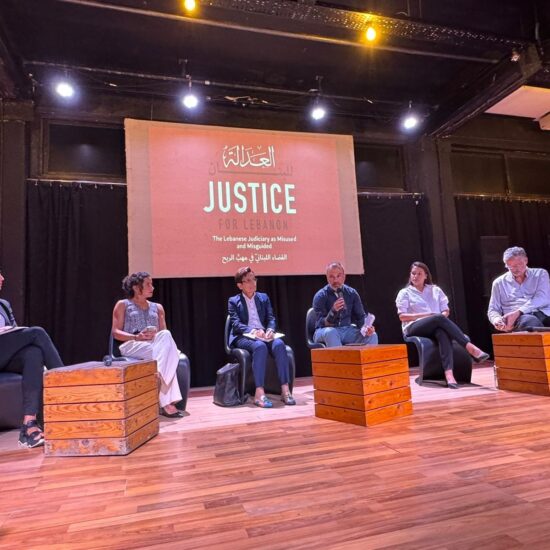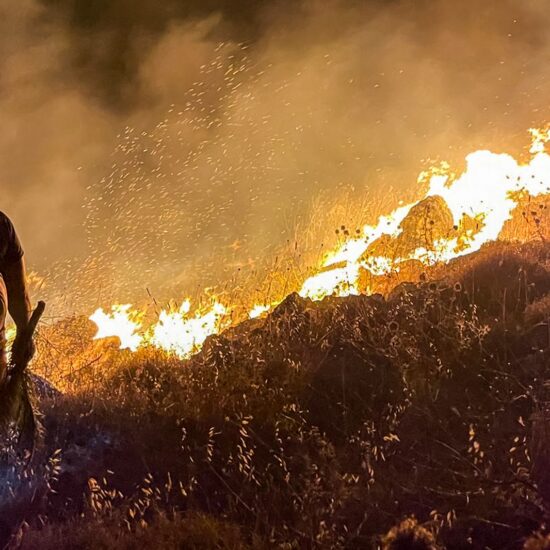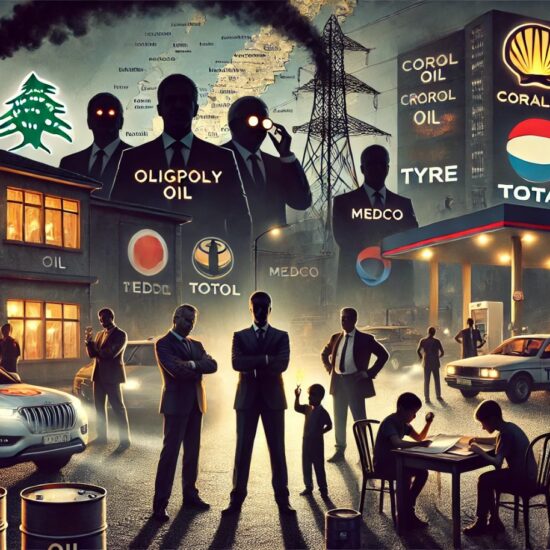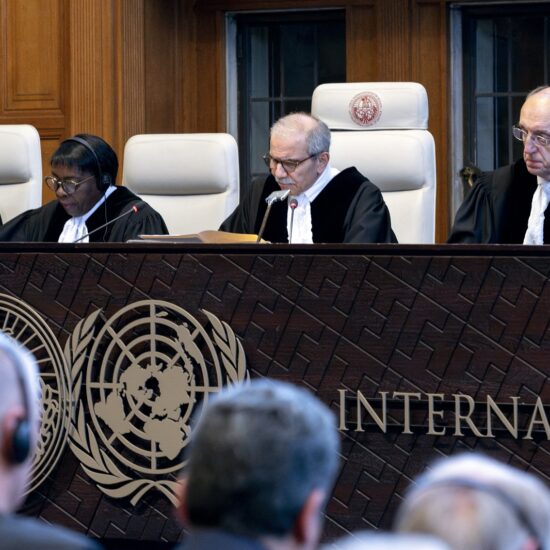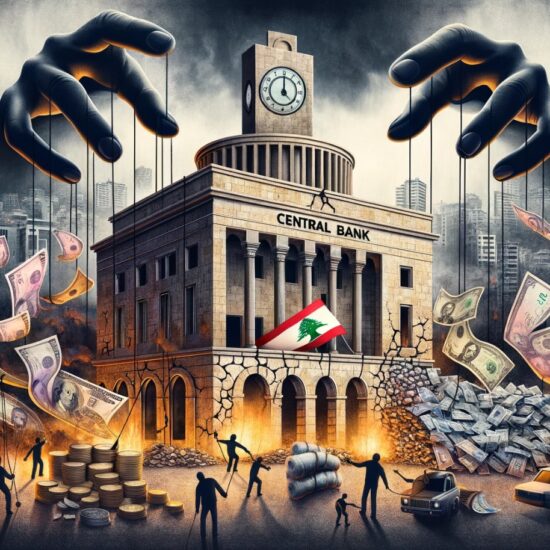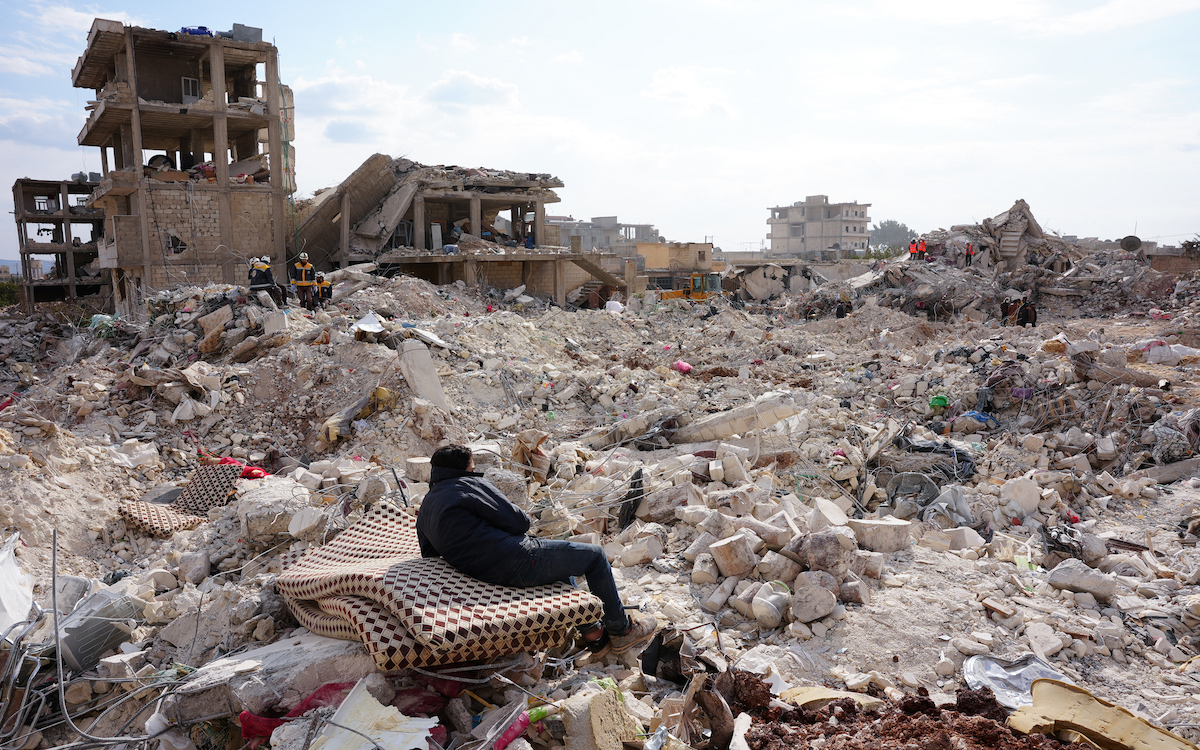
It started at 3:20 am Lebanon time.
The ground began to shake and buildings swayed from side to side with tables, glasses and pictures falling to the floor.
It lasted for 45 seconds but, for those in Lebanon, it felt like an eternity.
The cause of the shaking was a devastating 7.8-magnitude earthquake that originated in the Kahramanmaras region of southern Turkey, destroying large swathes of the region, including parts of northwestern Syria. and was felt by varying degrees throughout the Middle East with people as far south as Palestine and Israel saying that they felt it.
Early reports are suggesting that the #earthquake felt throughout #Lebanon was from a ~7.8 magnitude earthquake in #Turkey near Gaziantep. One aftershock felt so far. #لبنان #هزة_أرضية pic.twitter.com/JbM0D384AV
— Nicholas Frakes | نيكولاس فريكس (@nicfrakesjourno) February 6, 2023
This put the entire country on edge, as people fled their homes over fears that another quake would bring the buildings down on top of them.
In Tripoli, the mosques played Quranic verses and people shot in the air to wake the city’s residents up and warn them of the danger.
While no one was killed in Lebanon due to the earthquake, which registered locally at 4.8 magnitudes, there were reports of material damage – one building collapsed in Ain Atta, a village located in the Rashaya al-Wadi district – the psychological damage was immense.
Many in Lebanon went to social media to say that they looked outside to see where the explosion was coming from, while others said that they immediately moved away from their windows since they believed that they would shatter inward. They were reliving the August 4 Beirut Port explosion all over again.
Even after realizing that the shaking was not caused by an explosion, it did little to ease the minds of those in Lebanon.
When a 4.3-magnitude earthquake occurred in Arsal, by the Lebanese-Syrian border, it once again forced people from their homes in fear.
According to @LastQuake, the #earthquake just felt in #Lebanon and #Syria was a magnitude 4.3 and occurred along the Syrian-Lebanese border. #لبنان #سوريا #زلزال #هزة_أرضية pic.twitter.com/jhDrFeWAVD
— Nicholas Frakes | نيكولاس فريكس (@nicfrakesjourno) February 8, 2023
Syrians in the north of their country relived their own version of trauma when the quake struck.
For them, they did not look into the horizon to see what was blowing up; they looked to the sky to see where the Russian and Syrian warplanes that were bombing them had gone.
For years now they have lived under bombardment by Syrian regime forces and their Russian ally, so when the ground shook and buildings started to collapse, their first thought it was yet another bombing raid.
Despite it having been mother nature attacking them this time, the damage was massive.
Entire streets were leveled to the ground, trapping an untold number inside.
Those who managed to escape are left homeless, bearing freezing cold temperatures.
With the few resources available to them, Syrian rescuers began to try and save as many lives as possible.
In Turkey, the scenes following the earthquake are just as harrowing.
Cemeteries are expanding with sparsely attended funerals taking place one after the other as more and more bodies are pulled from the rubble.
In total, over 36,000 people have been confirmed dead, but with rescuers in both Syria and Turkey still digging through the wreckage, this number is only bound to increase.
In Lebanon
The missing: Due to the economic crisis in Lebanon, Lebanese have been emigrating throughout the world with a particular emphasis on Turkey, since it is significantly easier for them to get visas there.
Dozens of Lebanese have gone missing in the aftermath of the earthquake.
So far nearly a dozen Lebanese in Syria and Turkey have been confirmed dead, with around another 60 just in Turkey still missing.
View this post on Instagram
As rescue efforts have, for the most part, ceased, hope for any survivors has all but vanished.
Salameh takes his leave: Lebanon’s controversial Central Bank Governor Riad Salameh has had a turbulent career to say the least.
When he started out in the role, he was regarded as a financial magician who was able to turn the country’s ailing post-civil war economy into a booming machine.
Now, after over 30 years as BDL’s head, he announced that he would not be seeking to renew his term, which expires in May of this year.
“The decision for me is that when the term ends, it will be a turned page in my life and I will pursue things outside the central bank’s work,” he stated.
This decision also comes at a time when he is facing increased political pressure at home, as well as legal pressures in Lebanon and abroad over several alleged financial crimes.
The investigation comes to a stop…again: Judge Tarek Bitar said that he was postponing his interrogations with high-level officials, which were scheduled to begin last Monday, until legal challenges against him were settled.
Late last month, Bitar surprisingly announced that he would be resuming his investigation into the Beirut Blast, citing legal precedent as justification for his actions, and charged eight new people for the explosion.
However, this was quickly challenged by public prosecutor Ghassan Oueidat, one of the individuals charged by Bitar, who not only said that Bitar did not have the authority to continue his investigation, but also filed a lawsuit against him.
At the end of 2021, the Beirut Blast investigation was also indefinitely postponed due to lawsuits filed against Bitar by several of those he called in for questioning. Ouidat’s suit against him will likely have the same effect.
The lira comes tumbling down: The rate of the lira has continued to plummet, reaching new lows last week.
Initially, it surpassed 65,000 to $1 but has since devalued even further.
Currently, the lira is continuing to devalue, reaching 69,000, and without the government implementing any serious reforms, most believe this will be the continuing trend.
Update: the #lira has devalued significantly more to 69,000 to $1. #Lebanon #لبنان #ليرة #دولار https://t.co/QY6lvM7KVJ
— Nicholas Frakes | نيكولاس فريكس (@nicfrakesjourno) February 13, 2023
Banks shutter their doors for a third time: Lebanon’s banks announced that they would be closing their doors indefinitely in protest to a recent court ruling that said that Fransabank would have to give a depositor who sued the bank a check that amounts to their savings.
The banks are demanding that the ruling by the Court of Cassations, Lebanon’s highest court, overturn the ruling.
In addition to this, the banks are also demanding that the government implement the reforms demanded by the International Monetary Fund in order to unlock billions of dollars in aid.
However, the banks have consistently refused attempts to make their shareholders responsible for the crisis and have instead pushed for the government and depositors to shoulder the costs.
Last year, banks across the country went on an indefinite strike twice following a string of hold-ups by depositors who were demanding access to their locked savings.
The deadlock continues: Lebanon has been without a president for over 100 days so far and it is increasingly looking like this will remain the status quo for a while longer.
Several dozen MPs agreed to boycott the upcoming parliamentary session this week, in light of it being a legislative session. The 46 opposition MPs who announced their refusal to take part in the session argue is unconstitutional, and that the legislative body’s primary goal right now should be the swift election of a new president.
These opposition MPs claim that a normal legislative session cannot be held as the Constitution prohibits Parliament from conducting any other business once it has entered a special electoral session. The only exception to this is if there are extreme circumstances or if the specific topic being discussed in the session is of significant importance.
While 46 MPs are not enough to prevent a basic quorum from being reached, if a normal legislative session is held, it could call into question the legality of any legislation that is voted on and approved.
On Monday afternoon, it was announced that there would be no parliamentary session this week.
In the region
Temporary relief: In the wake of the earthquake in southern Turkey, the United States Treasury announced that it was temporarily lifting some sanctions on Syria so that more earthquake relief could make it into the country.
While the Caeser Act has a specific exemption for humanitarian relief, the sanctions imposed on Syria do pose a chilling effect when it comes to aid to Syria.
By lifting some of these sanctions, the US is hoping that more aid and earthquake relief can be brought into Syria without any concerns about facing sanctions as a result.
The temporary lifting will last for 180 days.
Cutting corners: Following the days of destruction in southern Turkey, Turkish authorities have arrested over 100 contractors believed to have been involved in the construction of the buildings in the affected areas.
These contractors are accused of taking shortcuts to ensure that the buildings that they constructed were cheaper than if they paid full price for all of the higher quality materials.
The government has also come under criticism for failing to do a thorough job in inspecting the buildings, especially after stricter standards were put into place following the devastating 1999 earthquake that killed 17,000.
This earthquake could be a make-or-break moment for Turkish President Recip Tayyip Erdogan, who is seeking reelection in May of this year.
Rising violence: Since the start of the year, violence between Palestinians and Israelis has been on the rise, with over 40 Palestinians killed so far this year alone.
Last Monday, an Israeli raid near the quiet Palestinian city of Jericho left five people dead. Israeli authorities said that they were looking for gunmen who allegedly tried to attack an Israeli West Bank settlement. Hamas claimed all five as their own.
More recently, on February 10, a Palestinian used his car to ram into pedestrians near a Jerusalem settlement killed three, including a six-year-old and an eight-year-old child. The driver was shot and killed at the scene.
Most observers expect violence to be on the rise as Israel’s new far-right government cracks down harder on Palestinians and as Palestinians, increasingly devoid of hope, view few alternatives to violence to end the occupation of their lands.
What we’re reading
Legacy: It has been two years since the murder of the activist and writer Lokman Slim. NOW’s Dana Hourany wrote about the events held to mark the solemn anniversary, and how his friends and family are attempting to keep his ideas alive.
Alone: In the week since the earthquake devastated southern Turkey and northwestern Syria, many photos and stories have come out depicting the situation. The Washington Post’s Louisa Loveluck recently wrote two of what I believe are some of the most powerful and heartbreaking so far. The first looks at the Syrian city of Jinderis, and how for days the rescuers and survivors there waited for international aid that never came. The second follows the story of Najwa Ibish, a Syrian refugee in southern Turkey, who was injured in the earthquake and lost her husband in the destruction as he died saving her and their youngest son. Her middle son is also in critical condition, and not expected to improve. Her family does not know how to tell her this.
A dog’s life: It is not just humans who are in need of rescuing following the earthquake but animals and pets as well. The Washington Post’s Dan Rosenzweig-Ziff wrote about the people who are trying to make sure that as many animals affected by the disaster survive.
Lebanon+
Podcasts: During the August 4 Beirut Port explosion, many people barely escaped with their lives. Bachir Ramadan was one of those people. He sat down with Ronnie Chatah for the latest episode of The Beirut Banyan to discuss his injury in the explosion, his love for drumming and how he continues to play despite the odds being against him.
Until next week, follow NOW Lebanon on Twitter, Instagram, Facebook, and LinkedIn, and subscribe to our weekly newsletter. And stay safe!



